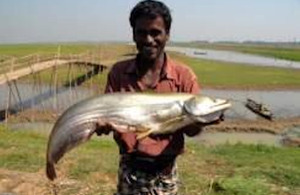DFID Research: Community-based fisheries management in Bangladesh
Better access to fisheries resources for community-based organisations has resulted in significant increases in their fishing incomes.

Fish in hand. Picture: WorldFish
The community-based fisheries management (CBFM) initiative has developed a series of management approaches for ensuring equitable access to fisheries resources for community-based organisations (CBOs). This has resulted in over 60% of those making a living from fishing in project areas experiencing significant increases in their fishing incomes.
The aim of the CBFM initiative was to provide research-based approaches so that sustainable management of inland fisheries could be handed over to CBOs. Fish sanctuaries have been established in over 80 waterbodies with the result that production of fish has risen, the income of CBFM fishers has increased, and biodiversity has improved. CBFM-type approaches have been included in the Government of Bangladesh’s new Inland Capture Fisheries Strategy and fisheries aspects of the Poverty Reduction Strategy Paper. At regional and global levels it represents a substantive body of evidence demonstrating that co- and community-managed approaches can result in more productive and sustainable fisheries, at the same time as safeguarding the livelihoods of poor fishing households.
Pilot projects began in the mid-1980s, but to scale up benefits, the approach of major institutions in charge of managing inland water fisheries needed to change. The overall goal of CBFM projects has therefore been to improve inland fisheries management policy and stimulate more sustainable, equitable and participatory management of resources.
Read the full version of this case study.
Key reference:
Halls, A. S., and M. G. Mustafa, (2006) Final Assessment of the Impact of the CBFM Project on Community-Managed Fisheries in Bangladesh. Report to the WorldFish Center, Bangladesh, September 2006, 83pp.